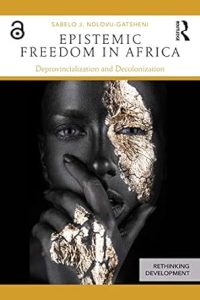A PANEL DISCUSSION ON
DECOLONIZATION/DECOLONIALITY, PART 5

Photo: Professor Soshe Kessi
Decolonization and Decoloniality: Aggregating the Thoughts from Soshe Kessi and Sabelo Ndlovu-Gatsheni
(This is the third interview report with a Panel on Decolonization/Decoloniality. For the transcript, see YouTube https://youtube.com/watch?v=WG0wn62xjtc.
Countless times, people have debated the hierarchy of importance regarding fields of study. As a matter of fact, this “not-so-open” debate has penetrated government agencies, serving as a supposed guide for curriculum design, assignment of eligibility scores during immigration processes, and the award of government grants and scholarships, among other cases. This debate posits that due to the several evolutions of humans — and the contributions of science and technology to the Industrial Revolution and the ages after — some fields of study in the sciences are superior to fields of study in the humanities, arts, and education, to name a few. Some have even gone further — in what I would call “unadulterated ignorance” — to claim that some fields of study should be nonexistent and are not worth being called academic disciplines. However, it is important to note that the evolution of human societies brought about formal education. As this formal education evolved, various fields of study emerged. Therefore, there is no academic discipline or course of study that exists that does not serve its purpose within the ecosystem of our society.
Furthermore, in the pre-interview pieces I wrote on decolonization and decoloniality, I endeavored to trace the importance of this academic field to our society by highlighting some of its contributions. During the last edition of the “Toyin Falola Interviews,” this was once again proven to be true. Professor Soshe Kessi, commenting on the existence of decolonization and decoloniality as an academic field, tied its emergence and expansion to numerous colonialism-induced anomalies that continue to plague the world. Previously an international development expert, Professor Kessi’s observation of the coloniality of development work, international aid, and the development industry inspired her to pursue a research career in this burgeoning academic field. There is no denying the large-scale racialization of the workplace dynamics in the development and international aid industries. The existing and widely accepted forms of intervention proposals and leadership expectations are connected to colonialist perceptions of the Global South as dejectedly poor, grossly undeveloped, never developed, and at the mercy of international aid for survival.
Professor Kessi further challenged the academic community for its complicity in perpetuating the coloniality of development work. One might ask, “How is that so?” Professor Kessi argues that external countries have funded academic research in Africa. This raises concerns about agenda-setting, power dynamics, and the potential for neocolonial knowledge production. It is, therefore, often subjected to the piper-and-the-tune concept, where the focus of the research would mostly be on the downsides of the continent, shaping it as needing Messianic redemption.
The challenge posed by Professor Kessi also explores the dependence of the international aid and development framework on three key assumptions. The first is the socio-economic dichotomy of the globe, whereby the Global North is developed and mostly self-sufficient, and the Global South is underdeveloped and highly dependent on the knowledge and recommendations of development experts and institutions in the Global North. The second postulated assumption relates to the perception of levels of poverty within the international aid and development sector. This assumption posits that levels of poverty are determinants of the levels of development.
Meanwhile, the third assumption is that because of the first two assumptions — underdevelopment and poverty in the “Global South” — the once-colonized people are the problem. Where people in the Global South are perceived as weak, helpless, destitute, displaced, affected by afflictions, war, diseases, violence, corruption, and the lack of knowledge and capabilities to catalyze the development of their continent.
Indeed, academia’s complicity is evident in published research perpetuating harmful stereotypes like “Black intelligence” (a racist term denoting subpar intelligence), smaller brain sizes in African populations, and an increased predisposition to criminality. This psychological research serves as a sounding board for the continued classification of Africans as inferior humans, making room for a separate hierarchical treatment of race groups.
The academic postulations about Africa have also contributed immensely to the politicization and racialization of development and international aid. It positions the Global North as a benevolent (and perhaps paternalistic) provider helping the Global South, when in truth, there are political and economic returns on these investments, either directly or indirectly accruing to the Global North for every form of aid extended to Africa.
More important for consideration is the fact that the bulk of the problems confronting Africa — causing underdevelopment and hardships — are largely tied to the decisions made by the leaders of African countries. These leaders fail to achieve optimal human capital, do not put the vast land resources to optimal use, have no sense of foresight to draw a long-term action plan for development, have no understanding of what continuity is in governance and are more concerned with politicking than leadership. Yet, they are the first to run, bowls in hand, to the Global North for aid and support — all of which they still end up not putting to any significant use.
Whenever people so much as debate why an entire academic discipline is dedicated to decolonization and decoloniality, it is important to ask these people to read about the current realities of Africans. They need to understand the lasting, still-present, multi-dimensional effects of colonialism on the continent and how the decolonization of the people’s minds is a fundamental step toward the positive change that is very often craved.
In the words of a leading decolonial scholar, Professor Sabelo Ndlovu-Gatsheni, “In the southern region (of Africa), colonialism and apartheid are not a past in the true sense of the word. They are a living reality which we are still trying to transcend.” A prominent Zimbabwean academic, Professor Ndlovu-Gatsheni is one of the strongest voices in the decolonization and decoloniality movements. He attributes much of his motivation to his own experiences, and those of his people serve as powerful motivators for his work. Many in Southern Africa had to take up arms to fight for their countries to attain freedom. That was the tragic reality many of the citizens were born into and grew up in, and it has served as a foundation for their worldview and resistance to colonialism. Furthermore, this region of Africa had its countries as the last dredges in the gourd of European colonization, earning their independence in the late 1900s.

Photo: Epistemic Freedom in Africa: Deprovincialization and Decolonization by Sabelo Ndlovu-Gatsheni
Ultimately, decolonization and decoloniality as a movement and an academic field have experienced several iterations and evolutions. However, what has remained through the decades is the commitment of Africans to the internal refinement of the African mentality. Over the years, scholars have examined the struggles for freedom and independence across African states and how these struggles have affected the psyche, mentality, and perceptions of the African people. Studies have also examined the systemic influence of colonialism on the African continent and how the different forms of colonialism were practised
to the detriment of the people — from the indirect rule that empowered the few and incited them against the many to the acculturation system that psychologically influenced the people to see their own cultures as inferior. Discourses such as these are vital to the work of scholars in the field of decolonization and decoloniality to ensure that the African continent is stripped of its dangerous colonial attachments.














You must be logged in to post a comment.